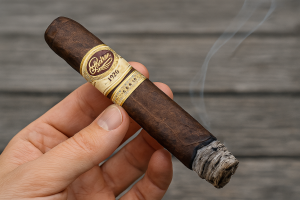How Profitable Is a Cigar Lounge: Key Factors, Market Trends, and Financial Considerations

The cigar lounge industry has been gaining momentum over the past decade, appealing to enthusiasts and entrepreneurs alike. With a warm atmosphere designed for relaxation and camaraderie, these lounges provide not just a place to smoke but a community for aficionados.
This blog post explores how profitable is a cigar lounge, offering insights into market trends, costs, and real-world examples to help potential owners navigate this niche business.
Understanding the Profit Potential of a Cigar Lounge
Opening a cigar lounge can be a highly profitable business, especially when managed well and located in an area with demand for luxury leisure experiences. Here's a closer look at the factors that influence profitability and the key revenue streams for cigar lounges.
1. Primary Revenue Streams
- Cigar Sales: The main source of revenue in a cigar lounge comes from selling cigars. Premium cigars have high-profit margins, often ranging between 50% to 80%. By stocking high-quality brands and rare finds, lounges can cater to aficionados willing to pay top dollar for a superior experience.
- Memberships: Many cigar lounges offer membership options that grant access to exclusive areas, discounts, and private events. Membership fees provide consistent revenue and encourage customer loyalty. Annual memberships can range from $500 to $2,500, depending on perks and exclusivity.
- Beverage and Food Sales: Offering drinks and light food can significantly boost profits. High-margin items like cocktails, whiskey, and specialty coffees complement the cigar experience and add to the overall ambiance. Pairing cigars with curated drinks can also enhance the lounge’s appeal, encouraging guests to stay longer.
- Pro Tip: Curate a unique drink menu that pairs well with various cigar profiles to enhance the customer experience and increase beverage sales.
2. Enhancing Profitability Through Ambiance and Services
- Luxury Environment: A cigar lounge is more than just a place to smoke; it’s an experience. Investing in comfortable seating, quality ventilation, and stylish decor can create a welcoming, upscale atmosphere that attracts patrons willing to pay for a premium setting.
- Events and Private Rentals: Hosting events such as cigar tastings, brand showcases, or private parties can bring in additional revenue and build a loyal clientele. Private rentals are particularly lucrative, with lounges able to charge premium rates for exclusive use of the space.
- Pro Tip: Partner with cigar brands or beverage companies to sponsor events, which can help reduce costs while increasing exposure.
3. Operational Costs to Consider
- Licensing and Compliance: Running a cigar lounge often requires specific licenses for tobacco sales and, if serving alcohol, additional liquor licenses. Ensure compliance with local regulations, as fines or delays in licensing can impact profitability.
- Ventilation System: Proper ventilation is essential in a cigar lounge to keep the air clean and comfortable. This can be a significant investment, but it’s crucial for customer satisfaction and regulatory compliance.
- Inventory and Staffing: High-quality cigars and knowledgeable staff are vital for the lounge’s reputation. Staffing knowledgeable employees who can recommend cigars and provide excellent service is key to encouraging repeat business.
- Pro Tip: Maintain a balance between premium and affordable cigar options to cater to a wider customer base while managing inventory costs effectively.
4. Location Matters
- High-Traffic Areas: A lounge in a high-traffic or affluent area can drive more foot traffic and attract customers with higher spending power. Areas near business districts, nightlife hubs, or upscale neighborhoods are ideal.
- Accessibility and Parking: A convenient location with ample parking or valet services can make the lounge more attractive, especially for guests who prefer a hassle-free experience.
- Pro Tip: Conduct market research to assess demand in the chosen area, considering demographics and proximity to competitors.
5. Estimated Profit Margins and Growth Potential
- Profit Margins: Cigar lounges generally operate with profit margins between 20% to 40%, depending on costs, pricing strategy, and additional services. Lounges that capitalize on memberships and events often see higher margins.
- Scalability: Successful lounges can expand by opening additional locations or offering branded merchandise. Another option is to build a reputation and attract high-profile clientele, enhancing the brand’s value and growth potential.
- Pro Tip: To improve profit margins, consider offering exclusive cigar accessories or branded merchandise as an additional revenue stream.
Case Studies: Successful Cigar Lounges and Their Business Models
Understanding the strategies of established cigar lounges can provide valuable insights for anyone looking to enter this industry. Here are two prominent examples of cigar lounges that have built profitable, thriving businesses by leveraging unique approaches, exclusive services, and community engagement.
Casa de Montecristo: A Blend of Retail and Lounge Experiences
- Location: Multiple cities across the U.S.
- Overview: Casa de Montecristo has developed a strong presence by merging a premium cigar lounge experience with retail operations. Each location is designed to provide a luxurious atmosphere where guests can browse an extensive selection of cigars and enjoy a high-end smoking lounge.
- Revenue Streams:
- Membership Programs: Memberships offer exclusive perks, such as discounts, private lockers, and access to members-only events. These memberships create a steady, recurring revenue stream while enhancing customer loyalty.
- Events and Tastings: Casa de Montecristo hosts regular events, including brand showcases, cigar tastings, and pairing sessions. These events not only generate additional income but also attract new customers and strengthen community ties.
- Key Takeaway: By combining retail and lounge spaces, Casa de Montecristo has created a comprehensive experience that meets a variety of customer needs. This hybrid model allows the business to attract a broad audience, from casual shoppers to dedicated cigar enthusiasts, maximizing revenue across different touchpoints.
Cigar City Club: Building Community Through Exclusive Access and Events
- Location: Tampa, Florida
- Overview: Cigar City Club has positioned itself as a premium lounge destination with a strong emphasis on community. Known for its upscale ambiance and curated cigar selection, Cigar City Club prioritizes member engagement and hosts diverse events that enhance customer loyalty and attract a steady flow of new patrons.
- Revenue Streams:
- Exclusive Lounge Access: Cigar City Club offers memberships that provide access to exclusive areas within the lounge. These memberships come with perks like reserved seating, priority service, and private lockers, making members feel like VIPs and encouraging repeat visits.
- Curated Events: The club frequently hosts themed events, pairing cigars with spirits, offering live music, and partnering with local artisans. These events create an engaged community atmosphere, drive traffic, and provide customers with unique experiences that go beyond simply enjoying a cigar.
- Key Takeaway: Cigar City Club’s profitability is closely tied to its commitment to creating an engaging, exclusive community. By focusing on customer experience and providing unique events, they’ve cultivated a loyal clientele that values the added perks of membership and exclusive access.
Challenges and Considerations in Running a Cigar Lounge
Starting and maintaining a profitable cigar lounge requires navigating various challenges unique to the industry. From regulatory compliance to market competition, understanding these considerations can help you build a resilient and sustainable business.
- Regulatory Environment: Knowledge of local regulations is critical as tobacco laws vary widely by state and city.
- Market Saturation: While demand is growing, the number of competitors is also increasing. Differentiation through unique offerings is essential.
- Economic Downturns: Luxury goods can be first to be cut from budgets during recessions; hence, a diversified revenue strategy can provide stability during tough economic times.
Navigate the Cigar Lounge Business with Confidence and Insight
In conclusion, while a cigar lounge can be a profitable venture, success hinges on strategic planning, a deep understanding of the market, and the ability to create a robust and differentiated customer experience.
By adopting best practices and leveraging insights from industry leaders, prospective lounge owners can navigate this niche landscape effectively.
Looking to stock your lounge with the best? Discover our premium cigars at Online Cigars.
Key Takeaways:
- Conduct Market Research: Understand your target demographic and local competition to create a tailored business plan.
- Develop Unique Value Propositions: Consider niche offerings such as exclusive memberships, events, and a diverse drink selection to enhance profitability.
- Create a Memorable Experience: Focus not just on the cigars but also on the atmosphere and community to promote customer loyalty.
- Stay Compliant: Stay updated on local tobacco laws and regulations to avoid legal issues that could threaten your business.















